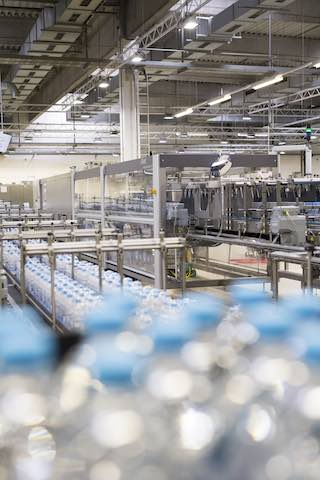KHS Is Driving the Digital Revolution in the Beverage Industry
Press release from the issuing company
Systems supplier researches networking and line optimization
The entire sector is talking about digitization and Industry 4.0 – but what do these oft-cited terms actually mean for the beverage industry? One thing is clear: their potential is vast. Digital technologies simplify processes, intelligently network systems with one another and relieve operator workloads. At the same time the digital revolution presents beverage producers and engineering companies with many mighty challenges. As one of the leading systems suppliers KHS is well aware of the significance these complex change processes hold for the success of a business. The Dortmund machine and systems manufacturer is thus driving a number of research and development projects which specifically focus on digital networking and line optimization.
For KHS, one goal of its group strategy is to boost line efficiency and cut down on the amount of resources used such as materials and energy. “When deciding whether we implement an idea or not, it’s the added value for the customer that counts for us,” states Dr.-Ing. Matthias Schopp, head of Engineering Systems at KHS. The Dortmund systems provider thus finds it prudent to enter into close cooperative partnerships with its clients to this end. “These provide the perfect conditions in which to approach new technologies with realistic expectations and with an open mind as to their outcome,” says Schopp. “This is demonstrated by our various sponsorship projects, for instance, where we can experiment with new technologies in a kind of ‘protected space’. This can definitely be referred to as a platform which enables our developers, together with experts outside the company, to try out new ideas that carry a certain risk of implementation.”
Networking and cooperation with research institutes and universities
KHS believes one vital driver of progress to be networking and cooperation with external research institutes and universities. At the time of writing, for example, KHS is involved in a project for additive production in maintenance logistics managed by a research consortium comprising scientists from the TU Dortmund, Ruhr University in Bochum and Fraunhofer Institute for Material Flow and Logistics (IML). In this process, which is also described as 3D printing, components are produced layer by layer. Among other things, this form of manufacture permits complex component structures to be fabricated that cannot be made using conventional methods and are to simplify the production of machines in the future. The 3D printing process also speeds up the supply of spare parts as production is much faster than conventional manufacture. At the moment the selected projects focus on networking, digitization and process optimization, however. “The overriding aim of our research activities is to make our lines and machines even more energy efficient and gentler on resources so that our customers also profit from these projects in the future,” Schopp explains.
Faster filling processes thanks to self-optimizing systems
One research project KHS recently brought to a successful conclusion with its partners bears the name DnSPro. This acronym describes the development of a filling system that is equipped with various sensors and an intelligent logic controller. “The results from this project can form the basis for future filling machines where the machine can perfectly adjust itself to a new project automatically, with the automated variation of filling parameters replacing manual setup procedures,” is how Schopp describes the benefits of the self-optimizing filling system. This development centers on the application of machine learning for perfect adaptation to the bottle form, making the filling process quicker and more efficient.
The project has evolved from a cooperation between five industrial companies and the Ostwestfalen-Lippe University of Applied Sciences and Ruhr University in Bochum. “Both the cooperation and interdisciplinary development of the machinery were exemplary in this project and will make a major contribution to future product developments,” claims Schopp.
KHS line optimization makes major contribution to sustainability
When developing new products KHS attaches special importance to the subject of efficiency. Significant aspects here include saving on materials, media and energy and the optimization of lines and machines. KHS is constantly working to make its systems even more efficient. Each component, however small, is therefore seen as an important part of the whole. “New functions in individual assemblies are successively changing our systems and machinery. We’re constantly working on giving all components the maximum efficiency and perfectly coordinating them with one another,” Schopp claims.
KHS is also hoping to gain new impetus for this endeavor from the EnAP project. The goal here is to devise energy-saving concepts and line optimization processes that can be used in pneumatic and electrical handling systems. The project, funded by Germany’s Federal Ministry for Economic Affairs and Energy, not only intends to help save energy and resources but also to enable the beverage industry to keep its overall operating costs down to a minimum.
Digital technologies relieve operator workloads
Another primary future concern for KHS is the interaction between man and machine. “Our aim must be to make the operation of the increasingly complex technology demanded by growing market requirements easier for human operators. With the help of artificial intelligence we want to engineer self-learning and self-optimizing systems,” explains Schopp.
At the moment KHS is examining the main basic principles in this area under the umbrella of the CyProAssist project. The objective is to develop an assistance system for production which supports optimum human machine operation. “We want to help machine operators so that operating errors are avoided and error states corrected as quickly as possible to permit high line availability,” Schopp explains.
Badische Staatsbrauerei profits from digital KHS technology
KHS’ cooperation with Badische Staatsbrauerei Rothaus shows that the use of digital technology in the beverage industry is no longer a vision for the future but very much a present-day commodity. The systems engineer from Dortmund recently supplied its long-standing customer with an Innofill Glass DRS glass bottler which includes many additional digital functions, such as a camera-controlled high-pressure injection control system called OPTICAM. This produces a fine jet of water which displaces the residual oxygen from the filled bottle and is thus of great importance for the quality and shelf life of the beer. With this new development KHS allows the head of foam to be continuously monitored and regulated without the need for operator intervention. In this way Rothaus can not only reduce the beer loss due to excessive foaming but also detect and reject bottles with insufficient foaming.
The newly developed DIAS diagnostic assistance system also has a positive effect on the filling process. Sensors in every single filling valve ensure constant monitoring and visualization during filling. This means that any deviations from the target values are immediately recognized. A further special mention should be given to the fact that the evacuation and CO2 purging processes are monitored to ensure low oxygen pickup. Broken bottles are consistently detected and damaged bottles automatically rejected. The sensor data can be retrieved at any time and used to statistically evaluate results, with the help of which future possible sources of error can be detected and eradicated in advance. In practice this not only makes fast, targeted repairs possible and relieves operator workloads but also provides a basis for maintenance work.
KHS considers cooperation with partners in research and industry future proof
KHS has been developing pioneering lines and machines for more than 150 years and thus had a lasting impact on the beverage industry – as it still does. During this time cooperation with partners from industry and research has been and still is a major aspect of KHS’ key to success. Successfully concluded projects such as DnSPro, which give KHS and its customers real added value, are manifestations of the success of this intensive cooperation. “All told, we can observe that our current sponsored projects lie in the right fields of research and are yielding results that are directly tangible. Besides these, our projects are also having a positive influence on the expertise gleaned by our employees. After all, we all also learn as we work,” Schopp sums up.

KHS is currently actively involved in a good number of research projects which focus specifically on line optimization and digital networking.
- Real World AI for the Printing Industry
- Harnessing the Power of Synergy: HP High Speed Inkjet and Indigo Liquid Toner Technologies
- KYOCERA NIXKA INKJET SYSTEMS (KNIS) INTRODUCES BELHARRA, THE NEW WAVE OF PHOTO PRINTERS
- New RISO Printing Unit Offers Easy Integration for Package Printing
- March 2024 Inkjet Installation Roundup
- Inkjet Integrator Profiles: Integrity Industrial Inkjet
- Revisiting the Samba printhead
- 2024 Inkjet Shopping Guide for Folding Carton Presses

WhatTheyThink is the official show daily media partner of drupa 2024. More info about drupa programs
© 2024 WhatTheyThink. All Rights Reserved.









Discussion
Join the discussion Sign In or Become a Member, doing so is simple and free